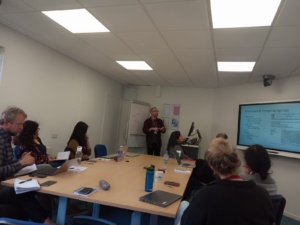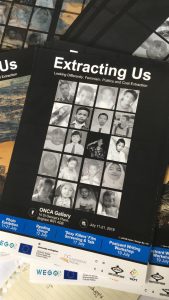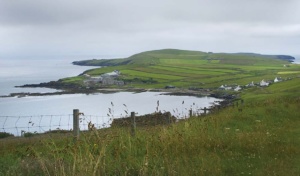WEGO members attended the 1st Utrecht Degrowth Symposium on 28 June 2019
Living on a finite planet – Alternatives to economic growth
All photos by WEGO members
WEGO members attended the 1st Utrecht Degrowth Symposium on 28 June 2019
Living on a finite planet – Alternatives to economic growth
All photos by WEGO members
I participated in the summer school of community economy network taking place in Punti di Vista, Bolsena from 1st to 6th June 2019.
The summer school aimed to understand the concept of the community economies and to use the approach to explain practices from the post-capitalist perspective.
I have been on secondment at SOPPECOM in Pune, Maharashtra since the 30th of September 2019. The secondment has formed an essential part of my training and preparation for my fieldwork in India, which will take place in Chennai, Tamil Nadu. I have spent the past few months learning about and understanding the complex dynamics of farmer suicides in the country from the perspectives of widows and women farmers. My work has predominantly entailed researching and writing a literature review on land rights and farm widows in India, which will support the advocacy processes of MAKAAM (a network of women farmers and activists, connected with SOPPECOM). My research has focused on the systemic invisibilisation and silencing of rural women, particularly widows, single or deserted women, and how this silencing has reduced the complexity of the agrarian crisis in India, thus curtailing the abilities of agrarian communities to cope and sustain their livelihoods.
During my time here I was also invited to join a national consultation organised by MAKAAM in Hyderabad, and a workshop on Women’s Land Rights, organised by SOPPECOM in Pune, as part of a wider research and advocacy project in Maharashtra. These experiences gave me valuable insight into the different levels and forms of advocacy happening in relation to women, farming and land rights in India. I also attended a three day workshop onReading Ambedkar, organised by the the Women’s Studies Centre at Savitribai Phule Pune University. This workshop was an incredible opportunity to understand the complexity of caste relations through the writings of Dr B.R. Ambedkar – a social reformer, philosopher, lawyer and Chairman of the Indian Constitution Committee. Taught by V. Geetha, a feminist activist and scholar, the workshop significantly developed my understanding of the interrelation of caste, gender, nationalism and Brahmanism.
These two months have therefore been very intense and I have learnt a lot in a very short space of time. In particular (and on reflection), this secondment has really been crucial in enabling me to connect the dots between global food justice movements (that work through decolonial, feminist and anti-capitalist theory and praxis) with the concerns, realities and advocacy of women farmers in India. I have been deeply affected by the stories of widows and their unraveling of the complexities of the agrarian crisis as it unfolds in their everyday lives. The interconnections between land, patriarchy and caste have therefore become central to my understanding of the agrarian crisis and have brought into focus for me the role of shame as both part of the reason for suicide, and an enduring experience for the women and families left behind. It seems to me that the psychological and embodied traumas experienced by exploited and dependent food producers, so central to their realities, needs more attention within debates around global food justice and alternative food movements.
In collaboration with MAKAAM, I will be continuing the final two weeks of my secondment in Chennai, where I will be meeting women farmers and hopefully working with women’s farming collectives. During this time I hope to explorepossible collaborations for my fieldwork and understand where and how my work can be useful in the context of ongoing advocacy and research processes.
Ankita Shrestha has an undergraduate degree in English Literature and History from Paris-Sorbonne University and a postgraduate degree in South Asia and International Development from the University of Edinburgh.
She is interested in the study of power relations that influence and determine natural resource governance and state formation. Her PhD research project will look closely into the role of political subjectivities in shaping decisions on who governs whom. She will examine how power struggles produced in the discursive field of climate change adaptation programmes legitimize certain knowledge and practices while delegitimizing others, and how the consequences of struggles thus produced ultimately determine priorities for coping with climate change in Nepal.

Eoin Farrelly is a political scientist and peace scholar with research interests in climate change, food sovereignty, the transition to a post-growth economy, gender, masculinities and power.
His PhD research will investigate the transformation of small-scale fishing communities in Scotland and Ireland. He has previously worked on LGBT Rights in Ireland, youth and community development in the north of England, and most recently as a programme assistant on a DfID and British Academy funded research project aimed at challenging simplistic narratives on brokerage in the migration sector. He holds a bachelor’s degree in Politics and Peace Studies from the University of Bradford and an MSc in Climate Change, Development and Policy from the University of Sussex and Institute of Development Studies. Tweets @eoinfarrelly83
11 -21 July at ONCA gallery Brighton
 WEGO members Siti Maimunah, Rebecca Elmhirst, Dian Ekowati, Alice Owen, Elona Hoover and ONCA Gallery manager Lydia Heath are organizing and co-curating an exhibition which seeks to ‘look differently’ at the politics of coal extraction. Taking an intersectional approach, they will bring together feminism, ecology, climate change and politics. Presenting photographs from Indonesia, the exhibition will include a workshop, reading group, film screening and talk by an Indonesian scholar-activist to create a space for challenging ‘north-south’ narratives and practicing climate justice.
WEGO members Siti Maimunah, Rebecca Elmhirst, Dian Ekowati, Alice Owen, Elona Hoover and ONCA Gallery manager Lydia Heath are organizing and co-curating an exhibition which seeks to ‘look differently’ at the politics of coal extraction. Taking an intersectional approach, they will bring together feminism, ecology, climate change and politics. Presenting photographs from Indonesia, the exhibition will include a workshop, reading group, film screening and talk by an Indonesian scholar-activist to create a space for challenging ‘north-south’ narratives and practicing climate justice.

Postcard Writing Workshop for Young People, Friday 19 July 2:00 – 4:00pm FREE
More information is available on Facebook and ONCA webpage
All photos by Siti Maimunah
This event is sponsored by:

ONCA is a Brighton based arts charity that bridges social and environmental justice issues. ‘With our public programme, we create inclusive spaces for collaborative learning, artist support and community solidarity.’
On 12 June Eoin Farelly attended a panel discussion on Democracy in crisis? Democratic innovations and the future of politics at IDS Sussex.
Eoin Farrelly attended the IIED Make Change Happen strategy launch on 12 June 2019
Marlene Gomez gave a presentation at Freie University Berlin entitled: Everyday food commoning practices in Alternative Food Networks: The case of Berlin and Barcelona, together with her supervisor Gulay Caglar
Suzanne MacDonald and Rob Snyder from Island Institute are presenting at “Strengthening Communities,” a conference in Aviemore hosted by the Highlands and Islands Enterprise.
The Strengthening Communities Conference Scotland brings together people who are at the heart of community-led development. The inaugural event was held in September 2017 and the second conference took place at the end of May 2019 at the MacDonald Aviemore Resort.
Five years ago, the Island Institute added the banner “Strengthening Communities” to their website. And late last month, Rob found himself being escorted—by a bagpiper, no less—to a keynote speaking engagement at the second “Strengthening Communities Conference” in the Scottish Highlands.
The conversations that took place over four days in Scotland echoed conversations in Maine’s island and coastal communities. The Highlands has a workforce housing crisis, broadband infrastructure is lacking, “depopulation” threatens its vitality, and its communities also are being undermined by a lack of local input into how the ocean is being developed.

The 2019 conference offered an opportunity to share ideas and experiences on the issues that matter most in community development. Its theme this year was ‘Ionnsachadh is fàs le chèile’, ‘learning and growing together’.
For more information, read Rob’s blog on the Island Institute website